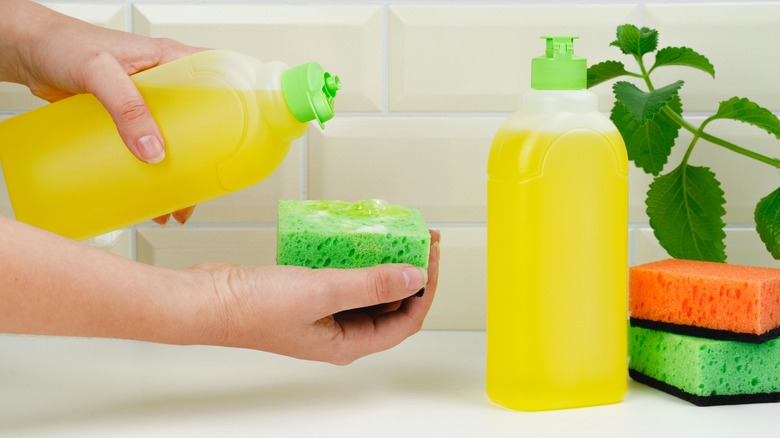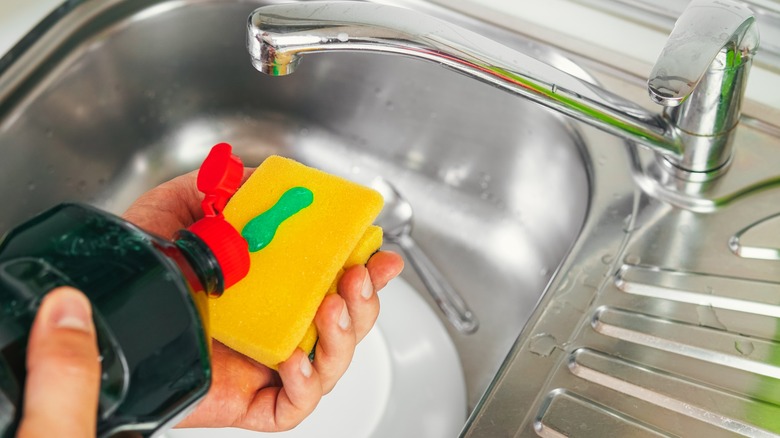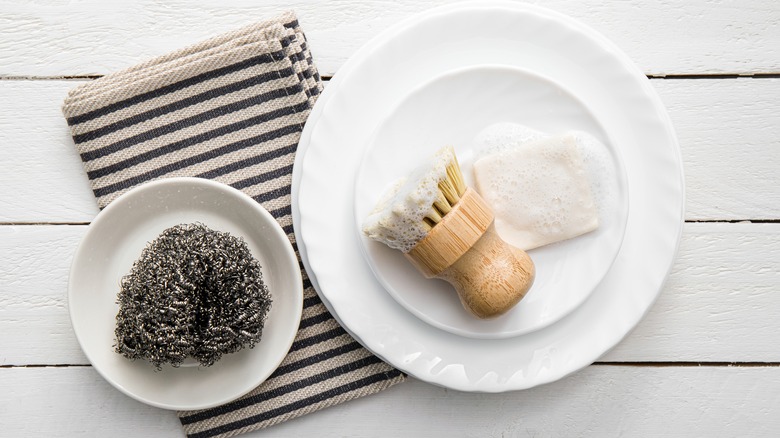How Much Dishwashing Liquid Should You Actually Use?
If you dread washing the dishes, you're not alone. According to Eat This, Not That, most people would rather clear the gutters or dust furniture than wash dishes. These days, most homeowners are lucky enough to have a dishwasher to help cut down on time spent standing over the sink. But even if you own one, pre-washing your dirty plates and pans by hand is often necessary if you want to avoid prematurely repairing or replacing your unit.
Handwashing dishes is hardly a budget-friendly task, considering the amount of water that goes down the drain — about four gallons every two minutes, according to Kitchn. Dish soap, in particular, seems to disappear quickly in busy households and can be surprisingly costly to refill. If you're reaching for the bottle after every few minutes, you're practically pouring money down the drain. Learn more about the common mistakes you could be making and how you can spend less time and money on washing dishes.
A little dab will do
Most people use too much cleaning liquid when washing dishes by hand. On their website, Dawn recommends using just a few drops of concentrated liquid for every sink full of dishes. Even with less concentrated formulas, you shouldn't need more than a teaspoon to get through a pile of dirty dishes. To avoid immediately rinsing your glob of soap down the drain, squeeze your sponge a few times after applying it. Squeezing will help the soap become foamy and last longer.
The New York Times suggests that a better way to complete the task and save on soap is by plugging the drain and filling your sink with water first. As the faucet is flowing, add about a teaspoon of dishwashing liquid under the running water to create a nice sudsy bath for your pots and pans to soak in while you scrub. Start with silverware and plates before you clean large dishes, as things like casserole dishes tend to be dirtier and require more elbow grease. Filling the sink with soapy water ensures each item will get a fair amount of cleaning action and prevents you from losing suds down the drain as you work.
Money-saving swaps
It might sound silly, but investing in high-quality, concentrated dish soap will save you money in the long run. Generic dishwashing liquids tend to be weaker, and the formulas are often diluted with water before you even squeeze them into the sink, forcing you to use more per wash. In addition to being rough on your wallet, Mindset Eco explains that liquid soaps aren't so great for your health; they can contain everything from synthetic materials to fragrances and preservatives that are bad for humans and the environment.
One way to ensure you're getting the most bang for your buck is to switch to a solid soap bar. Solid dish soaps can last much longer because they aren't diluted with water and are usually only a few dollars more than conventional liquid soap. In addition, they are often made with natural ingredients that are safer for your body and the planet and come in plastic-free or zero-waste packaging — however, check the packaging to be sure. Simply rub your sponge or scrub brush on the bar until it gets nice and foamy, and you're ready to wash. Plus, there are some beautiful soap dishes out there to make your kitchen counter look adorable.


